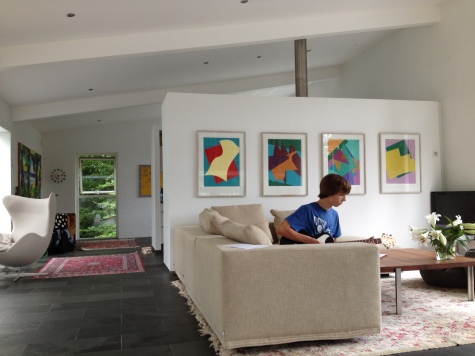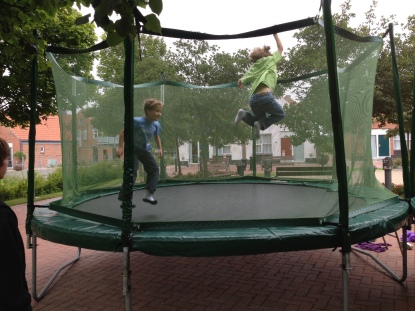Home Exchange: A Solution to Affordable Travel with Food Allergy, Celiac and Diabetes

If you took a look at our bags when we travel, you might think we’ve packed everything but the kitchen sink. The reality is that the kitchen sink awaits at our destination. As a family affected by food allergy, celiac disease and diabetes, having access to a kitchen is a crucial component of a successful trip. Options are increasing for those who want to cook, including suites, extended-stay hotels, and condos. My personal favorite is a home exchange. This is a fantastic way to travel!
Swapping homes is an affordable way to see the world — or to see your own country. There are a number of home exchange networks: Intervac, HomeLink, Homeexhange, Digsville and more. Admittedly, if you reside in California, New York City or Florida, you’ll have more options. If you live in rural Nebraska, you may have a harder time finding a family to swap homes with.
But you never know, maybe a former exchange student wants to return with his family and acquaint himself with the area again. That’s exactly what happened to us. We live in a medium-sized city in the Midwest that does not top the list of places that most foreign visitors would choose in the US and yet we’ve had plenty of offers. They include: central London, France, Finland, the Netherlands, Ireland, Denmark, Germany, Switzerland, Hungary and several locations in the U.S. including Alaska.
exchange student wants to return with his family and acquaint himself with the area again. That’s exactly what happened to us. We live in a medium-sized city in the Midwest that does not top the list of places that most foreign visitors would choose in the US and yet we’ve had plenty of offers. They include: central London, France, Finland, the Netherlands, Ireland, Denmark, Germany, Switzerland, Hungary and several locations in the U.S. including Alaska.
Our friends and family have been shocked that we would consider the option of swapping homes! We’ve been asked a number of questions.
What about your stuff?
This concern tops the list. My husband jokes that we don’t sweat the small stuff anymore after raising three kids in our house. It has definitely been broken in. If you’re worried about certain valuable items, they can be brought to a friend or relative’s house. And your financial files? Again, if you don’t have a locking file cabinet, you could put them into portable file units and cart them there, too.
Doesn’t the thought of a stranger sleeping in your bed bother you?
Have you ever slept in a hotel bed? Think of how many people have laid down in those beds. Thousands… No, it doesn’t bother me. By the time you do the exchange, you’re no longer strangers anyway.
How can you trust a stranger?
I guess I am willing to take risks. They are calculated though. When someone proposes a home exchange, it helps to review their page about themselves and the home they are swapping. Depending on the site, you can learn what the family likes to do for fun and what they do for a living. It helps my comfort level to know something about them.
Some sites have reviews from previous home swappers, which is invaluable. Personally, we prefer using a home exchange site that requires an annual fee as it means that your swappers are more likely to be serious about this option. If that person is a long-time member of home swapping organization, then they may be a safer bet.
Friendly correspondence is important! Ahead of time, we try to get to know our potential home swappers via email. By the time they are coming to our house, we have a pretty solid opinion about their trustworthiness and they, ours.
Nothing is fail-proof. There are risks, of course. I would say that it takes a certain personality: a person who won’t lose sleep over the thought of another family residing in your home, driving your car (if you agree to that), using your kitchen, opening cabinets to look for things, and yes, sleeping in your bed.
What’s it like to stay in a stranger’s home?
The flip side of this arrangement is that you have a big responsibility, residing in someone else’s home. The home swapper is trusting that you will be careful and won’t let your kids play ball in their house, eat spaghetti on their new couch, leave the place unlocked, etc. For me, that is the most nerve-racking aspect of home swapping. If you or your kids damage something, you’ll need to replace it.
If a prospective home is filled with white furniture and fine art and you have children, I’d suggest looking for a place a little more lived in. When we do an exchange, we keep this in mind. Are the seats at the kitchen table and the floor beneath it washable? Does the living space look like a place where your family can relax or is it filled with items that seem fragile or easily damaged? You won’t have a relaxing vacation if you have to stress about a particularly high-maintenance home.
How do you handle food allergens or gluten and cross-contamination?
When we dialog with a family ahead of time, we discuss our needs. With our son having celiac disease and a peanut allergy, we are concerned about cross-contamination! If you don’t feel like your prospective home swapper is taking you seriously, keep looking. We ask families not to bring peanuts or peanut butter into our house and they have been willing to oblige. We put our porous cutting boards, wooden spoons, GF toaster and Le Creuset pan away so we don’t have to worry about gluten contamination in our absence. Our shiny surface pans and utensils are left for their use. We have asked our guests to scrub off all items before putting them into the dishwasher, just as we do, and we have had no problems. If you’re concerned about your cookware, you could borrow kitchen items from friends or neighbors and put yours away. You can similarly vet a home swapper’s house ahead of time. If you had to buy a pan or two, it might still be cheaper than renting a condo.
 What we have to gain makes this risk so worthwhile.
What we have to gain makes this risk so worthwhile.
It is wonderful to have the comforts of a home when exploring new surroundings. It allows you to get a taste of life as a local, something I have always craved. Not only do we have an awesome itinerary, thanks to the inside scoop from our hosts, we are able to meet locals and settle in more easily. My kids have had the pleasure of jumping on the neighbor’s trampoline with their kids without the ability to speak the same language: an interesting experience!
Having the ability to cook meals tailored to our needs, means money saved and less stress searching for allergy-friendly, gluten-free dining options that will meet our needs. It also means that my son’s blood sugars are in better control as we are all eating healthier.
We spent three weeks in an expensive European city. As a typical tourist, the lodging and car rental would have cost us thousands of dollars. Instead, we paid an annual fee to our home exchange company. The reality is that we never would have visited this delightful country if it weren’t for this economical option. All this brought to you by a home swap.
Is a home exchange right for you?
- Is your home fairly well maintained? Do you live in an area with some desirable qualities? Get onto some home swapping websites and get a feel for what’s out there.
- Are you friendly and pretty easy-going? Are you wiling to trust others — but not blindly so? If you’re envisioning loading up a U-Haul to cart your belongings to someone’s house, this is not the option for you.
- Would you take the care of someone else’s home seriously? A successful home-swap is based upon this agreement.
If you answered yes to the above, swapping homes may be a viable option for you.
Happy Travels!

Great post and excellent response to the question about having someone else sleep in your bed. I’ll have to use that one myself next time I get asked! Swapping or renting out our place has been a great money-saver for us in the past. Although, I admit I was pretty nervous the first time!
LikeLike
Thank you! I’m glad to hear that you’ve had a lot of success with home swapping & renting. It is such an affordable option! The friendships that can come from it is an unexpected bonus! Have you found that, too?
LikeLike
Absolutely! You really get a sense of the person by the staying in their space (and vice versa), so there’s an inevitable bond I think.
LikeLiked by 1 person
A great insight – I have never heard of house swapping as an accomodation option before, but I’m from Australia. I’m diabetic and I usually just take a break from healthy eating when I’m on holidays. But then again I’ve never been away as long as you have and of course children, coeliac and food allergies would make it harder.
LikeLiked by 1 person
Is there a home exchange tool/website that caters to those of us with these special medical needs? that would be great.
LikeLike
There are many sites catering to various groups but none addressing special medical needs (that I know of). Wouldn’t it be wonderful if someone started one!
LikeLike